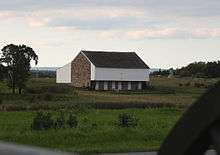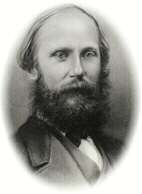Edward McPherson
Edward McPherson (July 31, 1830 – December 14, 1895)[1] was a Pennsylvania newspaper editor and politician who served two terms in the United States House of Representatives, as well as multiple terms as the Clerk of the House of Representatives. As a director of the Gettysburg Battlefield Memorial Association, he effected efforts to protect and mark portions of the Gettysburg Battlefield.


Early life and career
Born near Gettysburg, McPherson studied law and botany to graduate as 1848 Pennsylvania College valedictorian. In Thaddeus Stevens' firm in Lancaster, McPherson became a Whig. McPherson left the law practice due to illness and moved to Harrisburg, editing the Harrisburg American in 1851, and the Lancaster Independent Whig (1851-1854).[2] In 1855, he started and edited an American Party paper, the Pittsburgh Evening Times.[3] He moved back to Gettysburg the next year and resumed his legal career. He inherited his father's farm west of town along the Chambersburg Turnpike in 1858[4] and was elected to the 36th and 37th United States Congresses (1859-March 1863, Republican). He was a member of the Republican National Committee in 1860.
Civil War
McPherson organized Company K of the First Pennsylvania Reserves at the beginning of the American Civil War,[5] and was defeated in the 1862 reelection when his House of Representatives district (Adams, Franklin, Fulton, Bedford, and Juniata counties)[6] was expanded to include opposing Radical Republicans in Somerset County (substituted for Juniata).[7] President Abraham Lincoln appointed McPherson as Deputy Commissioner of Revenue in 1863. After the Battle of Gettysburg, McPherson became an officer of the Gettysburg Battlefield Memorial Association with an office on the corner of Baltimore and Middle streets,[8] and after Congressman Morehead nominated him, Thaddeus Stevens had him appointed as Clerk of the House of Representatives (December 8, 1863 – December 5, 1875).
Postbellum career
McPherson presided over the Republican National Convention in 1876, and President Hayes appointed him as director of the United States Bureau of Engraving and Printing (1877-8). Returning to the newspaper business, he was editor of the Philadelphia Press from 1877 until 1880. He also served as editor of the New York Tribune Almanac from 1877 to 1895 and was editor and proprietor of a newspaper in Gettysburg from 1880 until 1895. He was the American editor of the Almanach de Gotha. He again served as Clerk of the House of Representatives from December 1881 to December 1883 and for a third time from December 1889 to December 1891. McPherson was the attorney for the 1893 complaint against the Gettysburg Electric Railway which ended in the Supreme Court case of United States v. Gettysburg Electric Railway Co.[9]
McPherson died of accidental poisoning in Gettysburg[10] (interred Evergreen Cemetery (Adams County, Pennsylvania)) after being married to Annie D. Crawford McPherson in 1862[11][12] with four sons and a daughter.[13] The Edward McPherson Society is named in his honor.
Works
In 1941, the papers of Edward McPherson were added to the Library of Congress, and his published works include:
- McPherson, Edward (1864). Political History of the United States of America During the Great Rebellion.
- —— (1871). The Political History of the United States of America During the Period of Reconstruction.
- —— (12 September 1889). "Remarks of Hon. Edward McPherson". The Star and Sentinel. Retrieved 2012-01-15.
Popular Culture
In the 2012 film Lincoln, McPherson is portrayed by Christopher Evan Welch.
References
-
"Edward McPherson gravestone". Find a Grave. Retrieved 2011-11-01.
- "Image". Find a Grave. Retrieved 2011-11-01.
- "McPherson, Edward". Biographical Directory of the United States Congress. United States Congress. Retrieved 2012-01-15.
- "New Evening Paper". The Daily Pittsburgh Gazette. June 19, 1855. p. 3.
- Rummel, George A., III (1997). 72 Days at Gettysburg: Organization of the 10th Regiment, New York Volunteer Cavalry. White Mane. p. 73.
- "Two Hundred Gather to Hear Stories of 3-day Battle". Gettysburg Compiler. 12 August 1950. Retrieved 2013-03-16.
- "Hon. Edward McPherson Clerk of Congress". The Adams Centinel. 30 October 1866. Retrieved 2013-03-16.
- Part III, History of Adams County. History of Cumberland and Adams Counties, Pennsylvania. Chicago: Warner, Beers & Co. 1886. pp. 364–365.
- "Improvements". Gettysburg Compiler - Sep 23, 1902. 23 September 1902. Retrieved 2013-03-17.
- Hensel, W.U. (15 August 1893). "Gettysburg Trolley: Attorney General Hensel Refuses to Interfere". Gettysburg Compiler. Retrieved 2011-05-24.
- "Death of Edward M'Pherson" (pdf). The New York Times. 15 December 1895. Retrieved 2013-03-17.
- "Harvest of Grim Reaper: Mrs McPherson Quickly Succumbs to the Unexpected". Gettysburg Compiler. 5 December 1906. Retrieved 2013-03-17.
- "Married". The Adams Centinel. 18 November 1862. Retrieved 2013-03-17.
- "William L. McPherson Author and Editorial Writer, Dies Suddenly". Gettysburg Compiler. 15 November 1930. Retrieved 2013-03-17.
- Martin, David G. (2003). Gettysburg July 1. Combined Publishing. p. 584. ISBN 0-938289-81-0. Retrieved 2012-01-15.
External links
| U.S. House of Representatives | ||
|---|---|---|
| Preceded by Wilson Reilly |
Member of the U.S. House of Representatives from Pennsylvania's 17th congressional district 1859–1863 |
Succeeded by Archibald McAllister |
| Government offices | ||
| Preceded by Emerson Etheridge |
Clerk of the United States House of Representatives 1863–1875 |
Succeeded by George M. Adams |
| Preceded by Henry C. Jewell |
Chief of the Bureau of Engraving and Printing 1877 – 1878 |
Succeeded by O. H. Irish |
| Preceded by George M. Adams |
Clerk of the United States House of Representatives 1881–1883 |
Succeeded by John B. Clark, Jr. |
| Preceded by John B. Clark, Jr. |
Clerk of the United States House of Representatives 1889–1891 |
Succeeded by James Kerr |